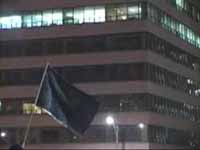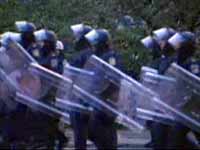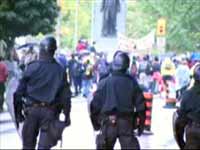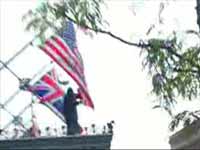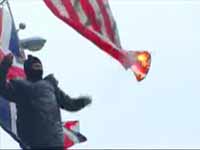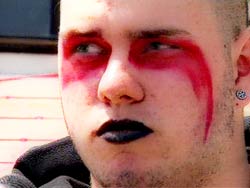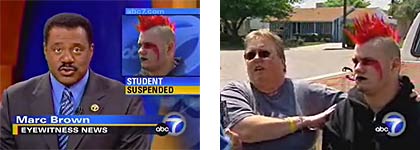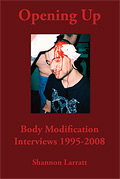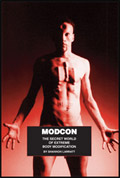
Picture this. The day before you're about to leave on a vacation with friends, you get up and decide to go to your favorite restaurant for lunch, a short bike ride away. As you head toward it, you realize that the streets are unusually crowded, and there are police in the area. You ask the cops what's going on, and they don't know. So you keep heading toward the restaurant, and as you round the corner on your bike, you come upon a row of riot cops headed toward you.
You turn around, deciding that this probably isn't the right day for a sushi lunch break, only to discover that the path back to your apartment has been barricaded by more cops. So you ask a police officer what you're suppose to do and they point you down another street and ask you to go there. After a moment of walking your bike in that direction, you realize that it's a dead end. You turn around, and the cop is right behind you.
“I just wanted to get you somewhere that I could arrest you,” he says, and you're jumped by several other cops who pull your arms behind your back and cinch plastic cuffs on you so tight they're cutting off the circulation. It's a mass arrest and the same starts happening to everyone around you. As they throw you onto the police bus with the others, you ask them to loosen the cuffs — instead they tighten them even more.
After spending the night in a makeshift outdoor holding pen, you're taken to prison and processed. At this point you've missed your flight by the way, and you've been charged with disorderly conduct, resisting arrest, parading without a permit, and obstructing government administration. You're offered a plea bargain — admit to disorderly conduct and you'll get time served. As a Harvard graduate hoping to do law or bank firm work, this could effectively end your career, so you opt to fight the charges.
The evidence presented against you includes sworn statements by the “arresting” officer — a woman who you've never met and is a different officer than the male officer who actually cornered, ambushed, and arrested you. Luckily there is some police video of the protest which includes you and it is released to your attorney. Even though they tell your lawyer it is the complete and unedited tape, it only shows you at the scene of the protest and then later footage of you already arrested and sitting cuffed with other prisoners. Unfortunately it shows neither your arrest nor your arresting officer, which are key since you need to show that you were peaceful and just asking the police how to get home, and that the sworn police statements against you are false and signed by an officer that wasn't even on the scene.
You go to I-Witness Video who has been collecting a large volume of footage from the event (which at this point you know was a protest against the Republican National Convention) and review what they have. Nothing. However, they later receive a video (from another RNC case) on which they recognize you and call your lawyer to come and review it. He comes in to see it and is at first dismayed because it appears to be the same tape as he has, which contains no useful footage — but then something strange happens.
The “unedited” tape the police released to you cuts off before your arrest and then resumes afterwards, but this tape shows the whole thing, confirming your story. It shows you peacefully approaching the police, asking some questions, and then being jumped and forcefully arrested — looking bewildered, but not resisting as they claim. In addition, it shows you being arrested by different cops than the ones that are testifying against you.
Eight months after your arrest, charges are quietly dismissed.
This is a true story, and Alexander Dunlop recently appeared on Democracy Now talking about his experiences. America has become a prison-industrial complex where police are perfectly happy to arrest the innocent, knowingly prosecute them on doctored evidence and false testimony, and cover-ups of government mistakes are the status quo.
While not at all as extreme, it reminded me of the OCAP protest I filmed in 2001 and you can download from this entry. After the protest (which was largely peaceful and noneventful), it was characterized as terrorism and “organized crime” with the goal of the “animals” being to throw molotov cocktails at Toronto's Sick Kids Hospital. None of the mainstream news agencies disputed these claims and repeated them nationally.
I really don't go to many protests (and don't go to any down here of course), but both of these events really drove something home, and that's how important it is for the public to seize the media to get the truth out. As much as we'd like to trust the government, or believe that the police are there to protect the public, none of that is true. They're there to protect the status quo at all costs, and to make sure the people at the top of the food chain stay there. Now, in general that means things stay stable, but it also creates a monster that's concerned not with justice but in sustenance.
Videotape and record everything, make copies, and put it online.
Bring your camera everywhere.
Note: the video is a pretty poorly done, low resolution clip from years ago but it may still be of interest to some people. If anyone has the high-res version, please let me know because my source tape for this is in storage. I'd like to fix a few of the mistakes in it…
On a mildly related note, I found this bizarre piece of advertising strange. If you look up the lyrics to NWA's Fuck Tha Police on LyricsDepot (warning: very spammy pop-up heavy site), it gives you two “recommended” CD purchase links on Amazon. Now, Straight Outta Compton, that one makes sense… but The Ultimate Percy Faith Collection. Seriously, WTF?



